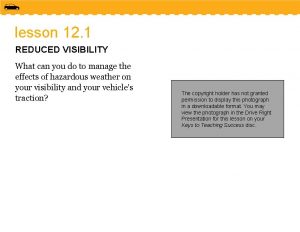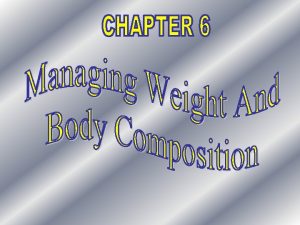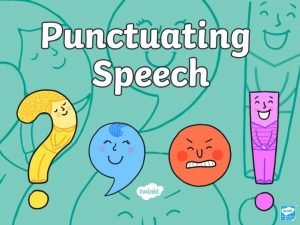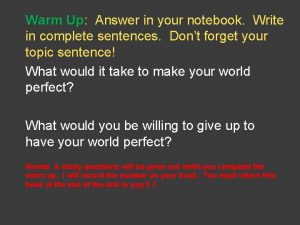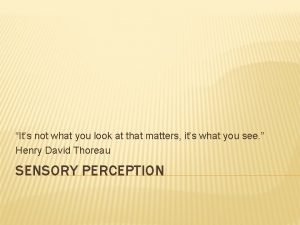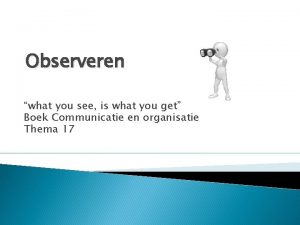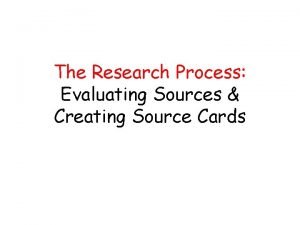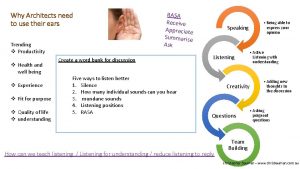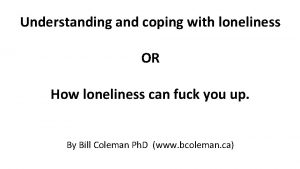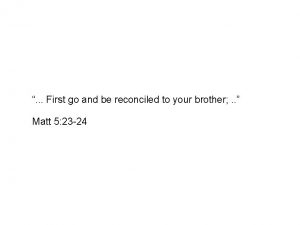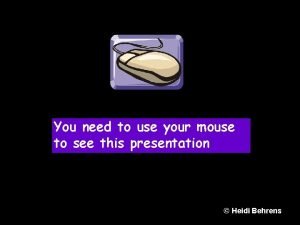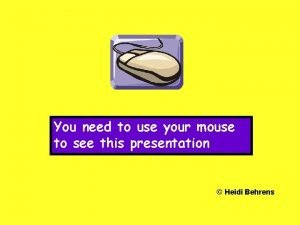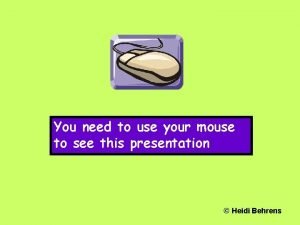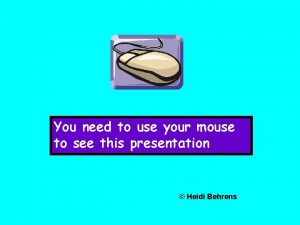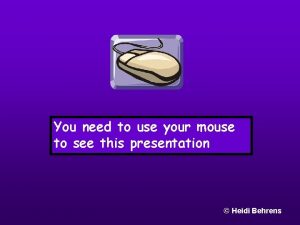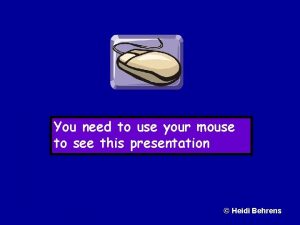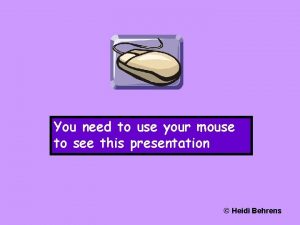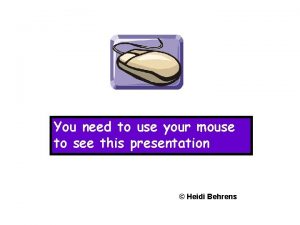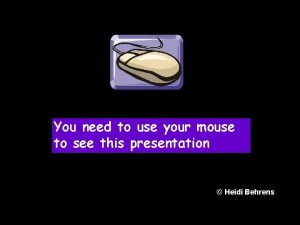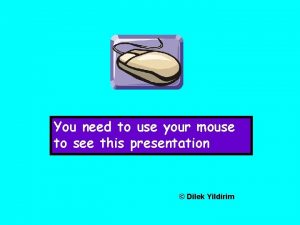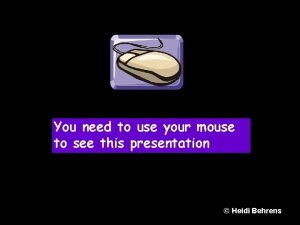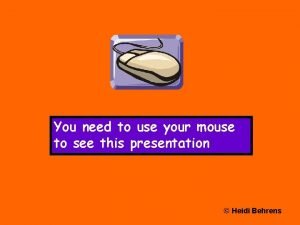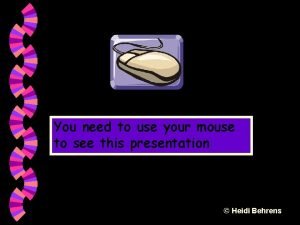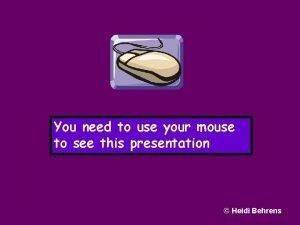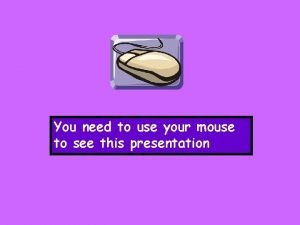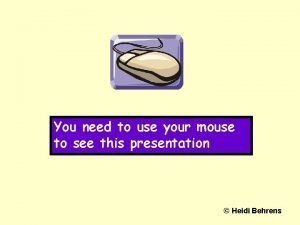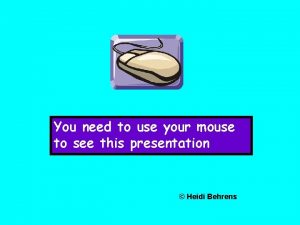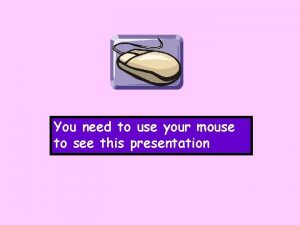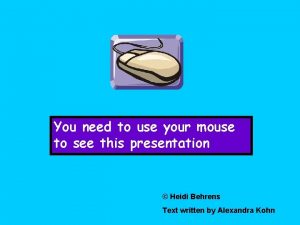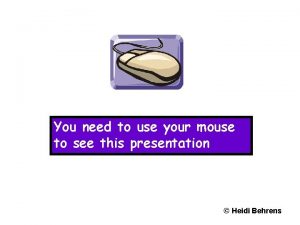You need to use your mouse to see























- Slides: 23

You need to use your mouse to see this presentation © Heidi Behrens

The world of sentences

A sentence is like theatre. Every member of a sentence plays a different role. So who are the actors and what roles do they play?

Let me introduce the actors: The Subject - Nominativ The Verb The Object - Accusativ

Let’s take a sentence like: Ich habe einen Hund I have a dog

Ich = Subject (Nominativ) The Subject (Nominativ) is like ‘actionman’. It is always doing the action

habe = Verb The Verb is the action itself, e. g. ‘playing’ or in our case ‘having’.

einen Hund Subject Object = Object (Accusativ) The OBJECT is the victim of the subject’s action. The SUBJECT is always doing something to the OBJECT!!!!

Now look what happens to the word ‘a’ in the following two sentences.

Subj. Verb Subj. Rover ist ein Hund Subj. Verb Obj. Ich habe einen Hund

Have you noticed…. . ? l ‘ein Hund’ in sentence 1 changes to l ‘einen l Hund’ in sentence 2. THIS IS BECAUSE ‘einen Hund‘ IS THE OBJECT (Accusativ) OF THE SENTENCE!!!!

The good news……. . This change only happens to masculine (blue) nouns

Subj. Verb Obj. Ich habe einen Hund eine Katze ein Kaninchen -- Haustiere

Now try and find out which role the English words play: Subj. has Verb ah amster Obj. my mot her

Subj. my mother Verb has Obj. a hamster

Subj. meets Verb l e a h c i M Obj. his frie nd

Subj. Michael Verb Obj. meets his friend

Now try the same with a German sentence: Subj. Verb Obj. eine r e d u r mein B n F isch hat

Subj. Mein Bruder Verb hat Obj. einen Fisch

Subj. Hau stie re Verb du Obj. hast

Subj. Verb Obj. Du hast Haustiere

Remember…. . After the verb ‘haben’ you always need an OBJECT. If the OBJECT is masculine ‘ein’ becomes ‘einen’!

Subj. Verb Obj. Ich habe einen Hund Hamster Wellensittich Fisch eine Maus eine Katze eine Schildkröte ein Kaninchen ein Pferd ein Meerschweinchen -- Haustiere
 Little mouse bsc
Little mouse bsc Dirty headlights can reduce visibility up to
Dirty headlights can reduce visibility up to Maintaining a healthy body composition and body image quiz
Maintaining a healthy body composition and body image quiz Split speech
Split speech How you use ict today and how you will use it tomorrow
How you use ict today and how you will use it tomorrow You put your right foot in
You put your right foot in Signature on passport
Signature on passport What comes to your mind when you see this logo?
What comes to your mind when you see this logo? Name
Name How do you see your future?
How do you see your future? In your notebook write the names of the defined professions
In your notebook write the names of the defined professions Rain
Rain Wish you a lot of strength
Wish you a lot of strength It's not what you look at that matters, it's what you see.
It's not what you look at that matters, it's what you see. If you could see the future what would you do
If you could see the future what would you do In the morning glad i see
In the morning glad i see Good afternoon me
Good afternoon me Rapporteren voorbeeld
Rapporteren voorbeeld Condicional
Condicional Cards evaluation of sources
Cards evaluation of sources Give us your hungry your tired your poor
Give us your hungry your tired your poor Why architects need to use their ears
Why architects need to use their ears Accept your loneliness you are your only friend
Accept your loneliness you are your only friend First go and be reconciled to your brother
First go and be reconciled to your brother

